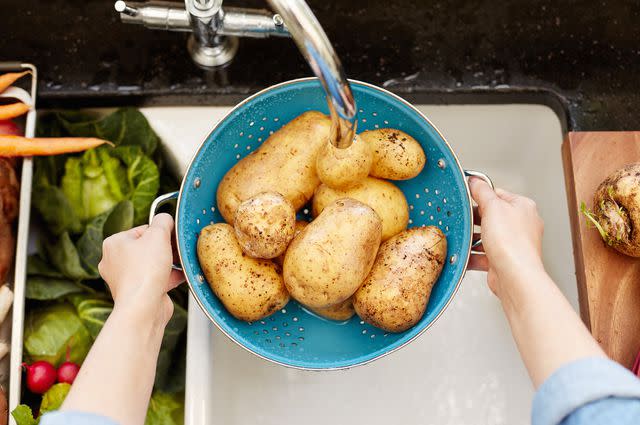The Right Way to Wash Potatoes Is Easy and Efficient
Even if you're going to peel them, these expert tips will ensure your spuds are clean and germ-free.
Fruits and vegetables should be washed thoroughly to make sure they are safe to eat (think: free of dirt and chemicals), and that includes a versatile, all-around favorite—the potato. Here, we explain why you should wash potatoes, the right way to do it (including when you should wash them), and the best way to store them.
Meet Our Expert
Catt Fields White, director of San Diego Markets and founder and CEO of Farmers Market Pros
Related: Our Favorite Potato Recipes Prove Spuds Truly Are Versatile
Why You Need to Wash Your Potatoes
According to the Centers for Disease Control and Prevention (CDC), at a minimum, potatoes should be rinsed under running water before cutting. This is crucial, even if you plan on peeling them, because germs on the outer skin can infiltrate the inside of your spuds when you cut them. It's essential to cut away damaged or bruised parts, too, for the same reason. Another important rule to follow: Do not use soap, bleach, disinfectants, or chemicals to clean produce.
The ground that potatoes grow in also factors into the equation. "Potatoes are firmly in the buried-in-soil category, so they'll need a thorough wash before cooking," says Catt Fields White, chef and the founder of San Diego Markets and The Farmers Market Pros. "In addition to good and bad bacteria, pesticides can linger in the soil and those need to go."

How to Wash Potatoes
Fields White recommends soaking the potatoes in cold water first before cleaning them to break up the dirt. "This is like soaking a dish that has dried food on it—it just loosens things up so you don't have to scrub," she says. Here's how to tackle your taters, step by step:
Soak the potatoes in cool water until the dirt on the vegetables is loose. Fields White says this makes cleaning easier, especially with a thicker-skinned potato, like a russet, or one grown in clay-based soil.
Once the dirt is loose, take the potatoes out of the water and gently scrub them one by one using a clean brush or a new soft scouring pad used only for cleaning vegetables. Pro Tip: Skin can tear or bruise on waxier potatoes, says Fields White. When washing waxier potatoes, such as baby potatoes or French fingerlings, use your hands rather than a brush to clean them.
Rinse the potatoes individually to rid them of any lingering dirt.
Potatoes That Will Be Peeled
If the potatoes are going to be peeled, Fields White says to wash them as outlined above—before the knife or peeler comes in contact. "After peeling, put them in water with a little lemon juice if you're not going to cook right away, or they'll discolor," she says.
How to Store Washed Potatoes
Potatoes should be cooked soon after they are washed since bacteria can gather on wet potatoes when stored for extended periods of time. "It's best to wash just before you cook, but they're probably fine to wash up to 24 hours before cooking," says Fields White. (For something like Thanksgiving mashed potatoes for a crowd, where you need to start prep early, Fields White says it's OK to wash in advance and then refrigerate.)
Storing Unwashed Potatoes
Unwashed potatoes (and sweet potatoes) should not be placed in the refrigerator for long-term storage, however. They should be stored in a cool, dark, airy space—not on the countertop—loosely stacked in a bowl or bins to keep moisture accumulation at bay and avoid mold and deterioration.
Read the original article on Martha Stewart.

